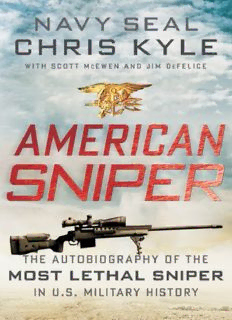
American Sniper The Autobiography of the Most Lethal Sniper in U.S. Military History PDF
Preview American Sniper The Autobiography of the Most Lethal Sniper in U.S. Military History
American Sniper The Autobiography of the Most Lethal Sniper in U.S. Military History Chris Kyle with Scott McEwen and Jim DeFelice Dedication I dedicate this book to my wife, Taya, and my kids for sticking it out with me. Thanks for still being here when I got home. I’d also like to dedicate it to the memory of my SEAL brothers Marc and Ryan, for their courageous service to our country and their undying friendship to me. I will bleed for their deaths the rest of my life. Contents Dedication Author's Note Map of Iraq Prologue 1 2 3 4 5 6 Photos 7 8 9 10 11 12 13 14 Acknowledgments About the Authors Credits Copyright About the Publisher Author’s Note The events that happened in this book are true, recounted from the best of my memory. The Department of Defense, including high-ranking U.S.N. personnel, reviewed the text for accuracy and sensitive material. Even though they cleared the book for publication, this does not mean they like everything they read. But this is my story, not theirs. We’ve reconstructed dialogue from memory, which means that it may not be word for word. But the essence of what was said is accurate. No classified information was used in the preparation of this book. The Pentagon’s Office of Security Review and the Navy requested that certain changes be made for security reasons. Those requests were all honored. Many of the people I served with are still active-duty SEALs. Others are working in different capacities for the government, protecting our nation. All may be considered enemies by our country’s enemies, as am I. Because of that, I have not given their full identities in this book. They know who they are, and I hope they know they have my thanks. —C.K. Prologue Evil in the Crosshairs Late March 2003. In the area of Nasiriya, Iraq I looked through the scope of the sniper rifle, scanning down the road of the tiny Iraqi town. Fifty yards away, a woman opened the door of a small house and stepped outside with her child. The rest of the street was deserted. The local Iraqis had gone inside, most of them scared. A few curious souls peeked out from behind curtains, waiting. They could hear the rumble of the approaching American unit. The Marines were flooding up the road, marching north to liberate the country from Saddam Hussein. It was my job to protect them. My platoon had taken over the building earlier in the day, sneaking into position to provide “overwatch”—prevent the enemy from ambushing the Marines as they came through. It didn’t seem like too difficult a task—if anything, I was glad the Marines were on my side. I’d seen the power of their weapons and I would’ve hated to have to fight them. The Iraq army didn’t stand a chance. And, in fact, they appeared to have abandoned the area already. The war had started roughly two weeks before. My platoon, “Charlie” (later “Cadillac”) of SEAL Team 3, helped kick it off during the early morning of March 20. We landed on al-Faw Peninsula and secured the oil terminal there so Saddam couldn’t set it ablaze as he had during the First Gulf War. Now we were tasked to assist the Marines as they marched north toward Baghdad. I was a SEAL, a Navy commando trained in special operations. SEAL stands for “SEa, Air, Land,” and it pretty much describes the wide ranges of places we operate. In this case, we were far inland, much farther than SEALs traditionally operated, though as the war against terror continued, this would become common. I’d spent nearly three years training and learning how to become a
